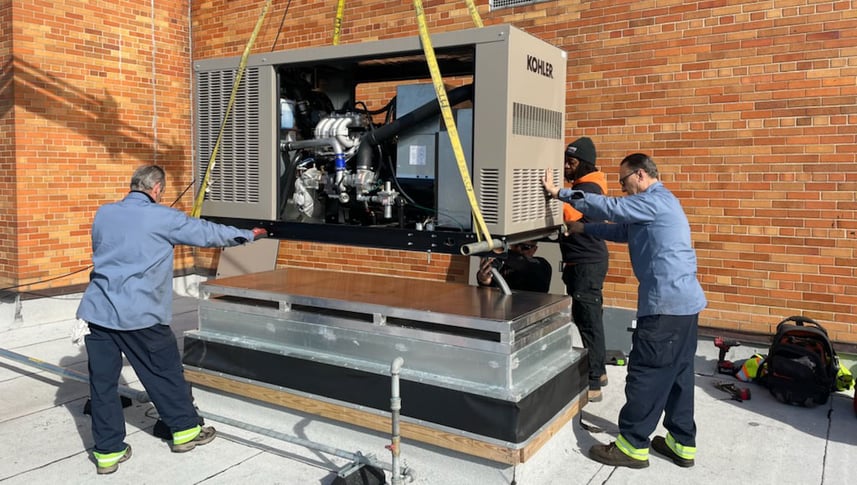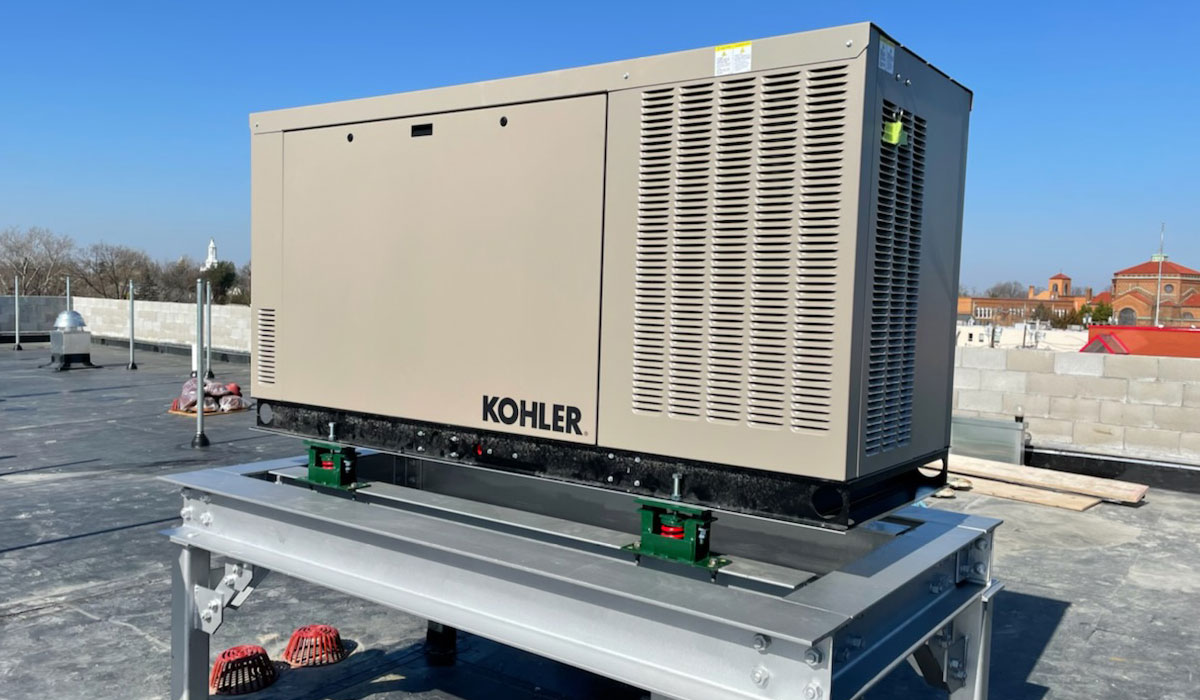Generators are essential operation components for businesses in any industry—from the pharmaceutical and medical sectors to supermarkets and office buildings. Whether powering refrigerators to sustain perishables or keeping electronics up and running, they provide continuous electricity throughout natural disasters, outages, and other disruptions.
With extreme weather events projected to increase in severity and frequency within the next several years, these life-saving pieces of equipment are more and more imperative. According to a Washington Post analysis: “severe weather fueled by climate change is pushing aging electrical systems past their limits, often with deadly results. Last year, the average American home endured more than eight hours without power, according to the U.S. Energy Information Administration—more than double the outage time five years ago.”
However, organizations often neglect installation until after disaster strikes—when it is unfortunately already too late.
For instance, when Hurricane Katrina devastated New Orleans in 2005, subsequent years saw an upsurge in generator sales. Mass outages, the coronavirus pandemic, and devastating storms are fueling a boom in generator installations across the United States, according to an NPR article detailing this ongoing spree.
To ensure uninterrupted operations during emergencies, it is crucial businesses proactively install generators beforehand, and carefully heed regulations for safe operation.
An Introduction to Commercial Generators
From devastating hurricanes to damaging windstorms, natural disasters causing widespread power outages leave essential businesses without electricity and unable to function.
When grids go down, everything from refrigeration to medical life-support equipment are affected. Food in supermarkets goes bad, people are left without necessary medical care, and lives are threatened.
The impact of outages to commercial entities can be costly, both in terms of the financial ramifications and downtime. A paper by The Electricity Markets & Policy Group at Berkeley Lab analyzing the cost of power outages found that “Interruptions affect commercial and industrial (C&I) utility customers by impeding or curtailing their production of goods and services. Commercial firms may need to close their office facilities because of a lack of lighting and air conditioning, and industrial firms may be unable to run machinery and other systems that manufacture their products. These impacts are generally measured as losses in normalized dollars as functions of the length of the power interruption, time of day and the season, facilities affected, presence of backup generation, current inventory, and other factors.”
To help prevent such outcomes, it’s imperative organizations across industries invest in their own, continued operation far in advance, by installing generators.
While it is human nature to react to emergency situations, it is prudent—and potentially life-saving—to anticipate them and bolster your organization’s power backups, accordingly.
Rushing to secure emergency electricity during a crisis could also cause people to overlook crucial best practices for safe installations and inspections.
 Installation Considerations & Potential Hazards
Installation Considerations & Potential Hazards
When having new generators installed, consider these few best practices and regulations:
1. Your Company’s Needs, Availability & Rated Load
Whether shopping between portable, gasoline, diesel, or other generator types, it is important to assess your company’s needs, inventory, and rated load—the amount it’s designed for.
Are you looking to power refrigeration, air conditioning, or medical equipment—or all of the above? Do you want to continue operations as though you never lost power? As generators are not all created equal, these questions help clarify the necessary wattage and generator you’ll need.
For instance, hospital diesel generators are ideal for powering heavy-duty, power-consuming environments such as large hospital buildings, whereas mini generators are best for small businesses or shops. The goal for these smaller facilities is similar: keep your communications running, computers operating, perishables from going down, and day-to-day operations.
2. Installation Distances From Windows, Doorways & Buildings
The Centers for Disease Control and Prevention (CDC) recommends placing portable generators outdoors and at least 20 feet away from any windows, doors, and vents. Although permanent generators can be placed closer in some cases, they still require proper installation to ensure safe use.
Not only do generators emit diesel and gasoline fumes, but also carbon monoxide—a colorless, odorless, tasteless gas responsible for the most common type of environmental poisoning in the United States, reads a CDC factsheet.
To mitigate this risk, companies should refrain from installing generators in basements, enclosed rooms, and even porches or spaces with open windows.
It’s also crucial to consider not only code specifications on how far to place units from a building, but also manufacturer instructions. Consider how Double R approaches the installation of permanent generators.
“Manufacturers require different distances,” explains Rodney Ragen, President of Double R Contracting. “We typically place units a minimum of 5 feet (from buildings). But then, you look at the manufacturer, and the manufacturer might say, ‘Well, we would like 7 feet.’ So besides national electrical code, we also have to factor specifications to see when and where you can install it.”
3. Selecting an Ideal Outdoor Location
When selecting an outdoor spot for your generator, it is important to also create a good foundation.
Double R contractors recommend placing generators on steel foundations, or in low-lying areas. To help ensure operation during hurricanes or floods, they can even be situated on stilts.
Double R: Your Generator Installation Solution
As we near peak hurricane season, it’s especially vital to proactively secure your company’s back-up power sources rather than wait for disaster to strike.
Doing so in advance enables you to take your time and ensure the above health and safety recommendations are implemented, so your vital tech and equipment run uninterrupted in an emergency—safeguarding food, medicine, machinery, and other essentials.
“The majority [of] people that we put generators in for had some sort of mass loss, and they're not going to let it happen to them again,” Ragen says. “It's very rare that somebody's so proactive, that they go out and they do it.”
When selecting the right contractor for the job, it’s prudent to choose someone with the necessary skills, licensure, and experience to get the job done right.
Boasting more than three decades of experience throughout Long Island, Queens, New York City, and Westchester, Double R’s expert team has been a trusted generator installer for numerous facilities, sizes, applications, and industries ranging from medical practices to pharmaceutical manufacturers, and many more.
Our one-stop shop of contracting, electrical, and security services provides unmatched quality and reliability every time, and possesses the licensing and specializations to meet your organization’s unique needs.
Whether installing generators, cellular alarm monitoring, fire alarms, electrical wiring, or other necessities, Double R helps you safeguard your organization’s future—and the essential services you provide when they’re needed most!
To learn more, contact us today.

